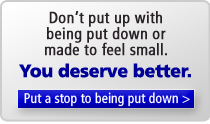Were Brand and Ross Just Too Confident?
The furore over the prank phonecalls made by Russell Brand and Jonathan Ross has been hard to avoid. Headline news items told us how out of order the phone calls were and asked questions of the BBC and how they could let such content go out on air.
With Russell Brand resigning, Jonathan Ross on a 3 month suspension and the much respected Radio 2 controller Lesley Douglas also having resigned, it now looks like the nature of comedy on the BBC is now subject to review and control.
Opinions vary, and while I didn’t find myself laughing at their vidcast I happen to think the headlines and the decisions made are entirely out of proportion with what happened. The mighty Terry Wogan agrees with me, so I must be onto something.
But that’s not what I want to write about now (actually, I do want to write about how ridiculous the whole thing is but I’ll hold myself in check for now), what’s interesting for me is whether Brand and Ross had become over confident and perhaps strayed into arrogance.
Both presenters were certainly on top of their game. Brand’s a big name here in the UK and has been making waves in USA with his first movie and hosting duties on the MTV Music Awards (where he famously called President Bush a ‘retard’ – I don’t remember calls for him to be fired for that). Ross has a huge cult following on his radio show and a ratings-winning chat show that attracts the best stars and talent and is one of the BBC’s flagship programmes.
So here’s the thing. If you’re at the top of your game, with a huge fan-base, a great reputation, a platform that lets you do what you want how you want to do it and a huge pay-packet to reward you for doing what you’ve been doing and encourage you to do more of it, it’s not difficult to see how someone can become a little over-confident.
That kind of position can lead to complacency and arrogance – a belief that your position is solid and that you can do whatever you want. Sooner or later you’re going to piss someone off, right?
Over confidence and arrogance gives room to stray into unacceptable behaviour.
Over confidence opens the door to doing whatever you want whenever you want to do it, so yes, I think both Brand and Ross had become over-confident and even strayed into arrogance. As their apologies have shown, they weren’t thinking about the impact of what they were doing, and even though they knew it was on the boundary of acceptability they just did it because they thought it was silly and funny.
They did what they did because it made them laugh in a juvenile way and because they thought their audience would get what they were doing. Which the vast majority of their audience did, considering that just 2 people made a complaint after the prank calls were aired, with the remaining thousands of complaints coming in once the story hit the headlines.
While they may have been over-confident, I’m not suggesting that they – or you – should filter their behaviour so as to please everyone else. That’s exactly the opposite of what I coach people to do and filtering what you do will only result in a filtered down, watery version of you. Yuck.
It was their act, their shtick.
I wouldn’t be at all surprised if there was a little voice in the backs of their heads that was telling them that they were really pushing their luck. I’m willing to bet that somewhere inside they knew that they were going to cause a stir and that they kept on going simply because they were performing.
What they did might have lacked good judgement but they wouldn’t have made it this far in their careers if they questioned everything they did and applied a filter to it.
So there’s a balance here. You shouldn’t filter what you do in order to please others because that will only strip your confidence and your ability to do what you’re best at, but neither should you ignore the impact of what you do.
When you choose the behaviour you have to be willing to be responsible for what happens as a direct result. If you’re over-confident or straying into arrogance then the outcome of your actions can have a much wider impact – and that means you have to be ready to take more responsibility.
God knows there have been times when I’ve shot my mouth off without thinking and had to apologise to people because I went too far with a joke and caused offence.
Both Brand and Ross acknowledge that they went too far and I suspect they know they were over confident. They took responsibility for the impact of their actions and made an apology which was accepted.
That should have been that. Knuckles rapped, lesson learned. Back to doing what they do best.
If British comedy becomes the next victim then the knee-jerk decision makers will need to have the confidence and willingness to stand up in a similar way as Brand and Ross to take responsibility for their own behaviour.
- Other articles you might like:
- How to Be Confident Enough to Do What You’ve Always Wanted
- 7 Ways to Win in 2009 #7: Jump in with Both Feet
- What I learned from Larry David
